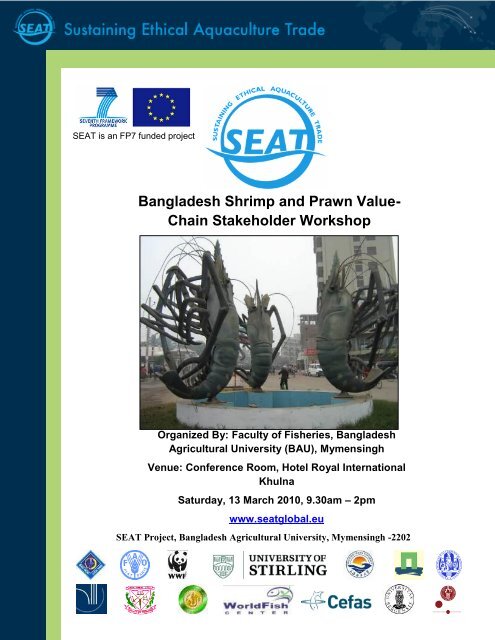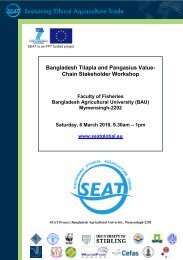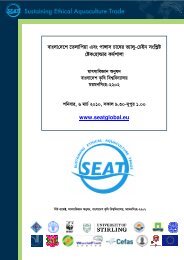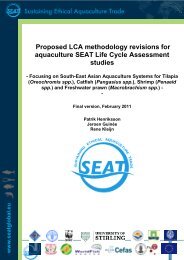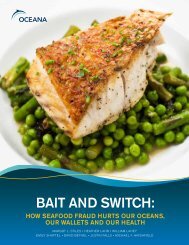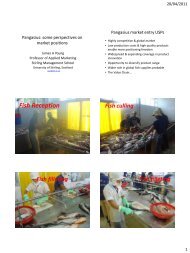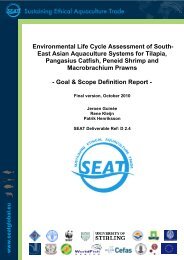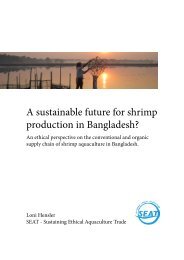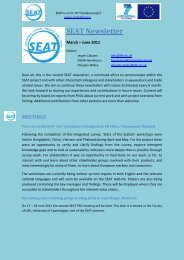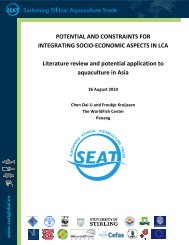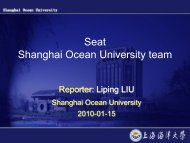English - SEAT is....
English - SEAT is....
English - SEAT is....
Create successful ePaper yourself
Turn your PDF publications into a flip-book with our unique Google optimized e-Paper software.
<strong>SEAT</strong> <strong>is</strong> an FP7 funded project<br />
Bangladesh Shrimp and Prawn Value-<br />
Chain Stakeholder Workshop<br />
Organized By: Faculty of F<strong>is</strong>heries, Bangladesh<br />
Agricultural University (BAU), Mymensingh<br />
Venue: Conference Room, Hotel Royal International<br />
Khulna<br />
Saturday, 13 March 2010, 9.30am – 2pm<br />
www.seatglobal.eu<br />
<strong>SEAT</strong> Project, Bangladesh Agricultural University, Mymensingh -2202<br />
1
Plates 1 and 2: Introducing stakeholders to the aims of the workshop.<br />
2
Contents<br />
Executive Summary 4<br />
1. Aims of the workshop 4<br />
1.1 Workshop schedule 5<br />
2. Outcomes of the workshop 6<br />
2.1 <strong>SEAT</strong> introductory presentation 6<br />
2.1.1 Questions/ comments following the <strong>SEAT</strong> presentation 6<br />
2.2 Group d<strong>is</strong>cussions and presentations 7<br />
2.2.1 Summary of presentations 10<br />
3. Comments, questions and answer session 19<br />
4. Concluding remarks 19<br />
Tables<br />
Table 1. Stakeholder groups and questions for the d<strong>is</strong>cussion activity –<br />
‘opportunities and constraints for development of the sector’ 8<br />
Plates<br />
Plates 1 & 2: Introduction to aims of the workshop 2<br />
Plate 3: Group work, depot and comm<strong>is</strong>sion agent 9<br />
Plate 4: Group presentation, Large scale Shrimp and Prawn farm owner 9<br />
Appendices<br />
Appendix 1. L<strong>is</strong>t of participants, other invitees and membership of d<strong>is</strong>cussion<br />
groups 20<br />
Appendix 2. Introduction the <strong>SEAT</strong> project – power point presentation 24<br />
3
Executive Summary<br />
A half-day stakeholder workshop was convened by Faculty of F<strong>is</strong>heries (FoF),<br />
Bangladesh Agricultural University (BAU), Mymensingh and that was held at Conference<br />
room, Hotel Royal International, Khulna. BAU <strong>is</strong> part of a consortium implementing<br />
Sustaining Ethical Aquaculture Trade (<strong>SEAT</strong>); a large-scale multi-national collaborative<br />
multi-national research project (EU FP7) investigating the sustainability of seafood trade<br />
between Asia and the EU.<br />
The main purposes of the workshop were to familiarize local stakeholders in the shrimp<br />
and prawn value chain with the aims of <strong>SEAT</strong> project. Moreover, to identify stakeholder<br />
perceptions regarding opportunities and constraints for development of an export<br />
oriented trade of shrimp and prawn. A final purpose was to gauge potential for<br />
collaboration of small and medium enterpr<strong>is</strong>es (SME) in an action research component<br />
of the project.<br />
After an introductory presentation (Appendix 2), a total of 59 participants were divided<br />
into eight groups to d<strong>is</strong>cuss constraints and opportunities. The groups were (1)<br />
government employees, researchers and academicians (2) feed, ice factory and other<br />
input suppliers (3) processors and exporters (4) large-scale shrimp and prawn farmers<br />
(5) small-scale shrimp and prawn farmers, (6) depot and comm<strong>is</strong>sion agents, (7)<br />
hatchery owners and (8) NGOs.<br />
Various constraints were identified by different groups regarding prawn and shrimp<br />
farming value chain. Presence of nitrofuran in frozen prawn product was the ever<br />
present factor resulting in financial loss. As a result, from 2005 to 2009, hundreds of<br />
shipments were rejected by EU causing a loss of US$ 500 million. Lack of good quality<br />
post-larvae (PL) and high price of PL was identified by both small - and large-scale<br />
shrimp and prawn farmers. Viral d<strong>is</strong>ease <strong>is</strong> the main constraint for shrimp farmers,<br />
locally called it as current virus, within one or two days all shrimp can die due to th<strong>is</strong><br />
d<strong>is</strong>ease. Prawn <strong>is</strong> less susceptible to d<strong>is</strong>ease, however sometimes health problems were<br />
attributed to damaging the antenna of prawn.<br />
Sudden natural d<strong>is</strong>aster i.e. cyclone AILA, was a major threat for shrimp and prawn<br />
farmers. Feed price has increased and doubled over last 5 to 10 years, but the price of<br />
shrimp has not increased with the same trend. Increased number of intermediaries in<br />
marketing <strong>is</strong> a constraint reported by academics, research and Govt. institutions.<br />
The recent development of depots has included improving infra-structure including pure<br />
water supply, mosaic floors to keep raw f<strong>is</strong>h hygienically, use of plastic boxes to carry<br />
f<strong>is</strong>h etc. Opportunities include farm reg<strong>is</strong>tration, which <strong>is</strong> expected to ensure the<br />
traceability of the farm producing shellf<strong>is</strong>h being marketed internationally. Awareness<br />
has been ra<strong>is</strong>ed among prawn and shrimp farmers about the use of antibiotics as it <strong>is</strong><br />
addressed by traceability scheme. The introduction of new machineries in the processing<br />
plants and the tendency of value addition to shrimp and prawn products have increased<br />
4
and in th<strong>is</strong> regards the majority of processing plants adopted HACCP and are thus<br />
approved by the EU. Feed quality <strong>is</strong> improving due to emergence of different feed<br />
companies and supply of high quality feeds in the competitive market. Different<br />
government projects and NGOs are working with different <strong>is</strong>sues for the development of<br />
shrimp and prawn farming sector.<br />
1. Aims of the workshop<br />
The workshop, convened by Prof. Dr. Md. Abdul Wahab, FoF, BAU and chaired by Mr.<br />
Md. Abdur Rashed, D<strong>is</strong>trict F<strong>is</strong>heries Officer, Bagerhat had the following aims:<br />
I. To familiarize stakeholders along the entire shrimp and prawn value-chain in<br />
Bangladesh with the aims of the <strong>SEAT</strong> project<br />
II. To identify opportunities and constraints for the development of the industry for<br />
export market<br />
III. Identification of SMEs with interest/ potential to participate in action research<br />
(WP9).<br />
A l<strong>is</strong>t of workshop invitees and participants <strong>is</strong> given in Appendix 1.<br />
5
1.1 Workshop schedule<br />
Time Program<br />
9.30 am Reg<strong>is</strong>tration<br />
9.55 am Guest take seat<br />
10.00 am Recitation from the Holy Quran<br />
10.10 am Welcome address<br />
Dr. Franc<strong>is</strong> Murray, IoA, UoS, UK<br />
10.25 am <strong>SEAT</strong> project for Sustainable Aquaculture Trade from Asia<br />
Dr. Franc<strong>is</strong> Murray, IoA, UoS, UK & Dr. Mohammad Mahfuzul<br />
Haque, Associate Professor, FoF, BAU<br />
11.10 am Tea Break<br />
11.30 am Group d<strong>is</strong>cussion<br />
Facilitators : Dr. Franc<strong>is</strong> Murray, Dr. Mahfuzul Haque, Mr. Golam<br />
Rabbani, Dr. Golam Faruk, Utpal, Ripon, Ali, Sadeq, Poly, Rafi<br />
Group A- SWOT (Strength, Weakness, Opportunity & Threat)<br />
Group B- Feeds, ice factory and other inputs<br />
Group C- Processors and export<br />
Group D- Large-scale shrimp and prawn farm owner<br />
Group E- Small-scale shrimp and prawn farm owner<br />
Group F- Depot and comm<strong>is</strong>sion agents<br />
Group G- Hatchery owners<br />
Group H- NGOs<br />
12.30 pm Group presentations<br />
12.55 pm Concluding remarks<br />
Mr Md. Abdur Rashed, DFO, Bagerhat<br />
1.00 pm Lunch<br />
2. Outcomes of workshop<br />
2.1 <strong>SEAT</strong> introductory presentation<br />
The presentation given jointly by Dr. Franc<strong>is</strong> Murray, IoA, and Dr. M. Mahfujul Haque<br />
(Ripon) – FoF, BAU, <strong>is</strong> presented in Appendix 2.<br />
2.1.1 Questions/ comments following the presentation<br />
Mr. Ajit Kumar Paul, Quality Control Officer, FIQC, DoF, Khulna<br />
- Research regarding food safety should be done from <strong>SEAT</strong> project<br />
- Nitrofuran <strong>is</strong> an <strong>is</strong>sue in prawn export to EU, research should be adapted to<br />
identify the source of semi-carbazide.<br />
6
Mr. Shahidul Islam, Sr. Upazila F<strong>is</strong>heries Officer, Paikgacha, Khulna<br />
- Presently there <strong>is</strong> a burning question of whether shrimp culture will continue or<br />
not considering the environmental impact and salinization <strong>is</strong>sues? Will the <strong>SEAT</strong><br />
project take any initiative on these <strong>is</strong>sues?<br />
Mr. Latiful Islam, Scientific Officer, BFRI, Paikgacha, Khulna<br />
- Incidental stop/ban of shrimp and prawn export from Bangladesh impacted with<br />
huge financial loss. About 100 shipments of frozen prawn products exported from<br />
Bangladesh were rejected by EU during the period from 2005 to 2009, as a result<br />
more than US$ 500 million of foreign currency earning was lost by Bangladesh.<br />
Does the <strong>SEAT</strong> project have any scope of research to identify how much losses<br />
have occurred/happened due to ban?<br />
Mr Ashraf Uddin, PRICE Project, Khulna<br />
- Will any initiative be taken by <strong>SEAT</strong> project for the negative impact of the<br />
presence of nitrofuran in shrimp/prawn through feed?<br />
2.2 Group d<strong>is</strong>cussions and presentations<br />
Participants were divided into 8 groups and asked the questions l<strong>is</strong>ted in Table 1 with<br />
the support of <strong>SEAT</strong> facilitators. After one hour of d<strong>is</strong>cussion – results were summarized<br />
on posters and presented back to the reassembled workshop for further d<strong>is</strong>cussion. The<br />
membership of the different groups <strong>is</strong> indicated in Annex 1.<br />
7
Table 1: Stakeholder groups and questions for the d<strong>is</strong>cussion activity –<br />
‘opportunities and constraints for development of the sector’<br />
Stakeholder Groups Questions Facilitators<br />
A. Academics, research<br />
and Govt. Institutions<br />
B. Feed, ice factory and<br />
other inputs<br />
C. Processors and<br />
exporters<br />
D. Large-scale shrimp<br />
and prawn farm owner<br />
E. Small-scale shrimp<br />
and prawn farm owner<br />
F. Depot and comm<strong>is</strong>sion<br />
agent<br />
Problem and opportunities of Shrimp and prawn in local &<br />
export market<br />
- Major changes in business last 5-10 years<br />
- Factor affecting the export of prawn and shrimp<br />
- How would you deal with the following <strong>is</strong>sues and how<br />
should export markets develop?<br />
a. return of consignments due to presence of antibiotics<br />
and other contaminants in shrimp and prawn<br />
b. meat and bone meal in shrimp and prawn feed<br />
c. other contaminants<br />
d. ind<strong>is</strong>criminate use of antibiotics<br />
- Major constraint and opportunities for exporting shrimp<br />
and prawn<br />
- Factors changing the last 5-10 years<br />
- What are the major factors that affect the shrimp and<br />
prawn farming business?<br />
- What are the major changes of these factors the last 5-10<br />
years?<br />
Mr Rabbani<br />
Utpal<br />
Franc<strong>is</strong><br />
As ‘D’ above Sadeq<br />
- What are the major changes of your business in the last<br />
10 years<br />
- What are the major factors that affect your business and<br />
their changes in last 5 years?<br />
G. Hatchery owners - Changes in business over last 10 years?<br />
- Common factors that influence the business over the last<br />
5 years?<br />
- Impacts of different rules & regulations:<br />
G. NGOs - Major factor for the success of shrimp and prawn farmer<br />
- Changes the factor over last 10 years<br />
Dr M. Mahfujul<br />
Haque<br />
Dr. Golam Faruk<br />
Dr. Md. Ayaz<br />
Hasan<br />
Ch<strong>is</strong>ty/Hazrat Ali<br />
Ripon/ Poly<br />
8
Plate 3: Group work, depot and comm<strong>is</strong>sion agent.<br />
Plate 4: Group presentation of large-scale shrimp and prawn farmers.<br />
9
2.2.1 Summary of presentations<br />
Group A: Academics, research and government institutions<br />
Presented by: Mr. Sirazur Rahman, Senior Upazila F<strong>is</strong>heries Officer, Asashuni, Satkhira<br />
Problem in local market<br />
Lack of good quality PL<br />
No seed certification<br />
Undeveloped water management<br />
Unplanned development of shrimp and prawn gher and infrastructural problem<br />
There <strong>is</strong> no separate zones for shrimp and prawn<br />
Lack of knowledge of farmer to identify d<strong>is</strong>ease and preventative measure<br />
Lack of technical knowledge about prawn and shrimp farming and insufficient training<br />
Lack of quality feed and insufficient ingredient and high price<br />
Lack of quality ice and farmers are unacquainted to use ice during transportation<br />
Lack of required vehicle<br />
Insufficient water source due to siltation in the river and canal<br />
Increase the number of middleman in marketing channel<br />
Undeveloped communication and lack of power supply<br />
Reduce quality of shrimp and prawn illegally<br />
Farmer do not get actual price due to control market price by processing plant<br />
Lack of hygienic baskets for transporting shrimp and prawn from the farm<br />
Lack of up to date marketing information at farmer level<br />
Opportunities<br />
To apply seed certification at hatchery level<br />
Re-digging river and canal<br />
Ensure water supply and d<strong>is</strong>charging facilities<br />
The sluice gate of water development board should be re-activated<br />
10
Re-build shrimp and prawn gher<br />
Sufficient training facilities<br />
Sufficient facilities of d<strong>is</strong>ease identification and prevention<br />
Made feed law and its implementation<br />
Produce quality ice<br />
Provide shrimp and prawn transporting vehicle by government and processing plant<br />
Reduce number of middleman for marketing of prawn and shrimp<br />
- remove foria<br />
- direct supply shrimp and prawn to processing plant<br />
Develop road and provide power supply in gher area<br />
Depot, arat and chatal should maintain quality<br />
Stakeholder should follow the rules and regulation and they should be honest at all level<br />
Should be defined and declared the price of shrimp and prawn<br />
Should be supplied sufficient plastic and insulated handy basket<br />
Low interest credit facilities to the farmer<br />
Problem in export market<br />
Reduce the quality of shrimp and prawn illegally<br />
Use cow-dung, poultry drop, poultry feed etc. in farm as shrimp and prawn feed<br />
Traceability and HACCAP were not implemented in all level of stakeholders<br />
Lack of machinery and skilled manpower for identifying d<strong>is</strong>ease and antibiotics<br />
Lack of honesty in businessman (at all level)<br />
Not maintained the rules and regulation in handling of shrimp and prawn<br />
Control the price of shrimp and prawn by processing plant and not paid money at due time<br />
Not maintained the F<strong>is</strong>h and F<strong>is</strong>heries (Inspection and Quality Control) Act 1997<br />
11
Group B: Feed, ice factory and other inputs<br />
Presented by: Mr. Ranjit Debnath, Sr. Marketing Officer, MEGA Feed, Khulna<br />
Major changes last 5-10 years<br />
Changes in use of pellet or commercial ready feed instead of loose feed<br />
Use of zeolite, minerals and chemicals with lime and fertilizer<br />
Business started with rice bran wheat bran, which was converted in ready feed, medicine and<br />
other aquaculture related input business.<br />
Competition about quality of feed<br />
Factor affecting the export of prawn and shrimp<br />
The presence of antibiotics (e.g. Nitrofurans, Chloramphenical) in prawn and negative attitude<br />
of EU to export prawn from Bangladesh<br />
There <strong>is</strong> a good scope of prawn export in international market, if we could maintain the<br />
traceability <strong>is</strong>sue correctly<br />
Different constraints including environmental, food security and white spot d<strong>is</strong>ease in case of<br />
shrimp<br />
How would you deal with the following <strong>is</strong>sues in export markets development<br />
(Table 1)<br />
Identify the sources of antibiotics and ra<strong>is</strong>ing awareness among hatchery owner, farmers,<br />
medicine supplier, feed producing company<br />
Take necessary action to stop importing of meat and bone meal and ensure the use of<br />
f<strong>is</strong>h meal or alternative source instead of meat & bone meal<br />
Control the use of pesticides<br />
Awareness ra<strong>is</strong>ing among the prawn and shrimp farmers through d<strong>is</strong>cussion the negative<br />
impact of antibiotic use.<br />
Facilitate intensive training for related different stakeholders including farmers, feed &<br />
medicine company, supplier, hatchery owner, aquaculture special<strong>is</strong>t etc.<br />
12
Group C: Processing and export<br />
Presented by: Mr. Ajit Kumar Paul, FIQC, DOF, Khulna<br />
Major constraint and opportunities for exporting shrimp and prawn?<br />
Lack of raw materials<br />
Value addition, white f<strong>is</strong>h and vegetable (opportunities)<br />
Laboratory-accreditation<br />
Traceability-fragmented farming<br />
Cluster farming (opportunity)<br />
Lack of farmer motivation and motivational training<br />
Technical knowledge constraints<br />
Training on GAP<br />
Factors changing the last 5-10 years?<br />
Currently, chemical non-compliance <strong>is</strong> more importance than microbiological compliance<br />
The rate of value addition in the final product has increased<br />
Traceability <strong>is</strong>sues have been introduced<br />
The training <strong>is</strong> going on GAP and motivation<br />
Introduce new machinery<br />
Group D: Large scale shrimp and prawn farmer<br />
Presented by: M. Sazzad Hossain, Kopilmuni, Paikgacha, Khulna<br />
What are the major factors that affect the shrimp and prawn farming business?<br />
Virus related d<strong>is</strong>ease of shrimp<br />
Natural d<strong>is</strong>aster like Aila<br />
Supply of virus free PL<br />
Adulterate fertilizer<br />
Pushing of unwanted materials into the value chain of large shrimp and prawn that<br />
impair the quality as well as market price of the product<br />
13
The license are <strong>is</strong>sued based the sanitation status of the gher<br />
Water supply facilities has improve due to develop sluice gate under 4 th f<strong>is</strong>heries project<br />
The soil and water quality were tested by government organization<br />
Lack of sufficient water at the right time<br />
NGO (WorldF<strong>is</strong>h centre) provides training<br />
Farmers need loan and subside from government and non-government organizations<br />
The price of feed has increased<br />
What are the major changes of these factors the last 5-10 years?<br />
D<strong>is</strong>ease occur<br />
Increasing natural d<strong>is</strong>asters<br />
Though NGO provides training on virus free PL but supply <strong>is</strong> not sufficient<br />
The supply of adulterate fertilizer increase day by day<br />
Though the use of unwanted materials in the value chain of product has reduced but it<br />
should be stopped fully<br />
The number of reg<strong>is</strong>ter farmer has increased<br />
The production of rice and other crop increased due to develop of sluice gate<br />
The rate of the testing of soil and water quality increased from 2002<br />
Water supply reduce due to river siltation<br />
Farmer are getting training but not sufficient<br />
The price of f<strong>is</strong>h feed are increasing but the price of shrimp or prawn did not increase<br />
Group E: Small-scale Shrimp and Prawn farm owner<br />
Presented by: Ayub Ali, Shrimp Farm owner , Soladana, Paikgacha and Nirod Roy,<br />
Prawn Farm owner , Line Bilpabla, Dumuria, Khulna<br />
Major factors for Shrimp and Prawn culture<br />
Water availability<br />
D<strong>is</strong>ease problem<br />
14
Increased feed price<br />
High price of PL<br />
Lower f<strong>is</strong>h price<br />
Flood problem<br />
Advantages of Prawn:<br />
Prawn <strong>is</strong> less susceptible to d<strong>is</strong>ease than shrimp<br />
Advantages of Prawn/shrimp marketing through chatal/arot<br />
Increased rice production<br />
Availability of tested PL<br />
Shrimp:<br />
Lack of water availability during season<br />
Increased occurrence of d<strong>is</strong>ease<br />
Increased salinity<br />
Advantages<br />
Short culture period<br />
Less feed <strong>is</strong> needed<br />
Changes of factor over last 5 to 10 years:<br />
Increased feed price<br />
Increased d<strong>is</strong>ease problem<br />
Increased lease value of land<br />
Increased employment opportunity<br />
Increased price of PL<br />
Increased flood frequency<br />
15
Decreasing gher/farm size<br />
Necessary initiative:<br />
Training<br />
Credit facility<br />
Water availability in due time<br />
Quality PL<br />
Group F: Depot and agent<br />
Presented by: Porimal Debnath, Poly F<strong>is</strong>h Depot, Kopilmuni, Paikgacha, Khulna<br />
What are the major changes of your business in the last 10 years?<br />
The large businessman get more benefit and smaller has stopped their business<br />
Developed depot ground floor using mosaic and tiles<br />
Use plastic basket<br />
Purchasing head on shrimp and prawn<br />
Use good quality water<br />
Medical facilities for staff<br />
What are the major factors that affect your business and their changes in last 5<br />
years?<br />
Imbalance in price<br />
Ice production <strong>is</strong> problem due to insufficient electricity<br />
Imbalance in grade<br />
Improved communication<br />
Syndicate in the business channel<br />
16
Group G: Hatchery Owner<br />
Presented by: Dr Md. Ayaz Hasan Ch<strong>is</strong>ty, Prawn hatchery owner, Khulna<br />
Changes in business over last 10 years?<br />
Partial changes of perception in farmers level<br />
Participation of GO, NGO, and private organizations<br />
Changes in production system (recirculation system, flow through system)<br />
Creation of competitive market<br />
Increase involvement of middle men<br />
Increase production cost<br />
Uncertainty of marketing<br />
Common factors that influence the business over the last 5 years?<br />
Capture of wild PL ind<strong>is</strong>criminately<br />
Illegal entrance of foreign PL and marketing<br />
Uncertainty of power supply<br />
Abnormal increased of price of fuel and other inputs<br />
Lack of financial support at Govt. and NGO level<br />
Seasonal changes<br />
Impacts of different rules & regulations:<br />
Approval from different government organizations<br />
Health-safety production system- d<strong>is</strong>ease free environment, applied recommended<br />
doses of antibiotics<br />
Suddenly change of government policy<br />
Political d<strong>is</strong>turbance<br />
17
Group H: NGOs<br />
Presented by: Mr Ashraf Uddin, PRICE Project, Khulna<br />
Major factors for the success of shrimp and prawn farmer<br />
Improved training<br />
Modern technology<br />
Regular feed application<br />
Availability of quality PL/fingerling<br />
Good marketing facilities<br />
Availability of all sorts of inputs<br />
Increased survival rate<br />
Contact farming<br />
No of gher/farm increasing<br />
Polyculture<br />
Partial harvesting when necessary<br />
Careful about farm preparation<br />
Increased awareness among farmer<br />
Net profit <strong>is</strong> increasing<br />
Changes the factor over last 10 years<br />
The skills of farmers increased through training<br />
The supply of good quality PL has been increased<br />
The supply of good quality feed has been increased<br />
Farmer are now well organized in group<br />
Farmers have good linkage with different service providers for necessary service and<br />
input<br />
18
Improve marketing facilities through depot/arot<br />
Increased the availability of ice<br />
Farmers are more aware to maintain the quality of prawn after harvesting<br />
Increased awareness among farmers for environment friendly prawn and shrimp culture<br />
The traceability activities has been started<br />
Availability of necessary machinery and other inputs.<br />
3. Comments, question and answer session<br />
Depot and comm<strong>is</strong>sion agent<br />
What type of prawn <strong>is</strong> supplied in the processing plant (either head-less or head on)?<br />
Do the workers use dress/ apron during processing?<br />
How do you maintain medical fitness of the worker in depot?<br />
Hatchery:<br />
- Which PL source <strong>is</strong> better (hatchery or wild)?<br />
- Why survival and growth differences vary between hatchery and wild? What measures<br />
can be taken to solve th<strong>is</strong> problem?<br />
Processing plant:<br />
- As the processing plants can utilize 12 to 20% of their capacity. So does the processing<br />
plants developed in unplanned way?<br />
- If the f<strong>is</strong>h production <strong>is</strong> less, why sometimes those are dumped?<br />
4. Concluding remarks with vote of thanks: Mr. Md. Abdur Rashid and Dr Franc<strong>is</strong><br />
Murray<br />
Participants were thanked for their active participation in the workshop and for<br />
making it productive with valuable information which <strong>is</strong> needed for the investigation<br />
of various work packages within <strong>SEAT</strong>.<br />
19
Appendix 1: L<strong>is</strong>t of participants, other invitee and membership of d<strong>is</strong>cussion<br />
group<br />
Group 1. Academics, research and Govt. institutions:<br />
SL. No. Name and designation Name of the<br />
Institution<br />
1. Md Abdur Rashed, D<strong>is</strong>trict F<strong>is</strong>heries<br />
Officer, D<strong>is</strong>trict F<strong>is</strong>heries office,<br />
Bagherhat<br />
2. Mr Md Golam Rabbani, AD,<br />
Department of F<strong>is</strong>heries, Khulna<br />
3.<br />
Div<strong>is</strong>ion, Khulna<br />
Mr. Latiful Islam, Scientific Officer,<br />
BFRI, Paikgacha<br />
4. Mr. Amirul Islam, Scientific Officer,<br />
BFRI, Paikgacha, Khulna<br />
5. Mr Sirazur Rahman, Sr. Upazila<br />
6.<br />
F<strong>is</strong>heries Office, Asashuni,Satkhira<br />
Shankar Chandra Howlader, SUFO,<br />
Dumuria Upazila, Khulna<br />
7. Mr. Chandra Shekhor Nandi, SUFO,<br />
Fakirhat, Bagherhat<br />
8. Md Shahidul Islam, SUFO, Paikgacha<br />
Upazila, Khulna<br />
9. Md. Abdul Mannan, SUFO, Rampal,<br />
Bagerhat<br />
Group 2 : Feeds, ice factory and other inputs:<br />
1. Utpal Kumar Dutta, Research<br />
Associate, <strong>SEAT</strong>, BAU<br />
2. Rafiqul Islam, Area Sales Executives,<br />
ACI Ltd, Khulna<br />
3. Khorshed Alam, Marketing Officer,<br />
Quality Feeds Ltd, Khulna<br />
4. Mr Ranjit Debnath, Sr. Marketing<br />
officer, MEGA Feed, Khulna<br />
5. Mr. Pervez, Apon Trading, Kalibari<br />
Road, Khulna<br />
Contact Mobile<br />
number<br />
DOF, 01716485063<br />
DOF, Khulna 01712715430<br />
BFRI, Paikgacha 01715645260<br />
BFRI, Paikgacha 01191521221<br />
SUFO, DOF, Satkhira 01712667990<br />
DOF 01711190783<br />
DOF 01712144720<br />
DOF 01711135381<br />
DOF, 01717065327<br />
<strong>SEAT</strong> BAU 01712261573<br />
ACI Ltd, Khulna 01714092752<br />
Quality Feeds Ltd,<br />
Khulna<br />
01713443543<br />
Marketing officer 01712192053<br />
Input (Feed, Chemical<br />
& medicine) Dealer<br />
01916705838<br />
01712996252<br />
Group 3 : Processing and export<br />
1. Dr Franc<strong>is</strong> Murray, IoA, UoS, Stirling IoA, UoS, Stirling<br />
2. Abdur Razaque, Inspector, FIQC, FIQC, DOF/ 01712925392<br />
Khulna<br />
Processing & export<br />
3. Mr. Ajit Kumar Paul, Quality Control FIQC, DOF/ 01712257206<br />
20
Officer, FIQC, DOF, Khulna Processing & export<br />
4. Mohammad Golam Mostafa, Quality FIQC, DOF/ 01715916066<br />
Control Officer, FIQC<br />
Processing & export<br />
5. Abdur Rahim, Commercial Officer,<br />
National Seafood Ltd, Khulna<br />
Processor and exporter 01718051927<br />
6. Mr Abul Hossain, Asian Sea food Processing plant 01915723327<br />
7. Mr Sirdhartha Sankar Roy, Atlas Sea<br />
Food Ltd, Rupsha Approach Road,<br />
Khulna-9100<br />
Processor and exporter 01913580708<br />
8. Humayun Kabir, Director, BFFEA BFFEA, Khulna 01712584626<br />
Group 4 : Large-scale shrimp and prawn farm owner<br />
1. Dr Mahfujul Haque Associate Professor,<br />
FoF, BAU<br />
2. Md Mazibur Rahaman, Rampal,<br />
Mongla, Bagerhat<br />
Large Shrimp & Prawn<br />
Farm Owner,<br />
3. Md. Ziaur Rahman, Paikgacha Large Shrimp farm<br />
owner<br />
4. Gazi Aktaruzzaman, Shyamnagar Large Shrimp Farm<br />
Owner,<br />
5. S.K. Shahajahan Hossain, Paikgacha,<br />
Khulna<br />
Large Shrimp farm<br />
owner, Paikgacha<br />
6. Md Moznu, Rampal, Mongla, Bagerhat Large Shrimp Farm<br />
Owner,<br />
7. M. Sazzad Hossain, Kopilmuni,<br />
Paikgacha, Khulna<br />
Large Shrimp farm<br />
owner,<br />
8. S.K. Rafiqul Islam, Shyamnagar Large Shrimp farm<br />
owner<br />
9. M. M Israfil Ahmed, Paikgacha Large Shrimp farm<br />
owner<br />
10. Tutul Kazi, Pikgacha, Khulna Large Shrimp Farm<br />
owner<br />
11. Anadi Kumar B<strong>is</strong>was, Line Bilpabla,<br />
Dumuria, Khulna<br />
Large Prawn farm<br />
owner<br />
01712006294<br />
01712405585<br />
01711668175<br />
01715339829<br />
01718868564<br />
01712144681<br />
01715211629<br />
01820052028<br />
01925325465<br />
01911264377<br />
01198079308<br />
21
Group 5 : Small-scale shrimp and prawn farm owner<br />
1. Md Sadequr Rahman <strong>SEAT</strong>, BAU 01723229101<br />
2. Rafiul Kabir BAU 01717005910<br />
3. Mr Rabiul Islam, Dumuria, Khulna Small Prawn Farm<br />
Owner, Khulna<br />
01925370019<br />
4. Nirod Roy, Line Bilpabla, Dumuria, Small Prawn farm 01912857180<br />
Khulna<br />
owner<br />
5. Tusher Kanti Sarkar, Chitalmari Small Scale Prawn<br />
farm owner<br />
01719566140<br />
6. Gitendra Hawlader, Bagerhat Small Scale Prawn<br />
farm owner<br />
01723843267<br />
7. Nirmal Sardar, Soladana, Paikgacha Small<br />
owner<br />
Shrimp Farm<br />
8. Md Mamun Ahmed, Soladana, Small Shrimp farm 01917876860<br />
Paikgacha<br />
owner<br />
9. Md. Shafiqul, Khoira Small Prawn farm<br />
owner<br />
01921290757<br />
10. Ayub Ali, Soladana, Paikgacha Small Shrimp farm<br />
owner<br />
01916058539<br />
11. Md. Anowarul, Soladana, Paikgacha Small Shrimp farm<br />
owner<br />
01714632446<br />
12. Md Akram Hossain, Paikgacha, Khulna Small Shrimp Farm 01712336212<br />
owner<br />
13. Md Abul Kalam, Shyamnagar, Satkhira Small Shrimp Farm<br />
owner<br />
01724704730<br />
Group 6: Depot and comm<strong>is</strong>sion agent<br />
1. Dr Golam Faruk, The World F<strong>is</strong>h<br />
Center<br />
The World F<strong>is</strong>h Center 01714102453<br />
2. Md Shahin Hossain, Depot/Arot 01729953216<br />
3. Mr Munna Comm<strong>is</strong>sion Agent Comm<strong>is</strong>sion Agent 01711298631<br />
4. Porimal Debnath, Poly F<strong>is</strong>h Depot, Depot/arot 01714083610<br />
Kopilmuni, Paikgacha, Khulna<br />
5. Md. Abdur Rashid, New Shibsa F<strong>is</strong>h,<br />
Paikgacha, Khulna<br />
Depot/arot 01720565713<br />
Group 7: Hatchery owner<br />
1. Hazrat Ali, <strong>SEAT</strong> BAU <strong>SEAT</strong>, BAU 01712308428<br />
2. Dr Md. Ayaz Hasan Ch<strong>is</strong>ty, F<strong>is</strong>heries Khulna University/ 01730004141<br />
and Marine Science Technology Prawn Hatchery owner<br />
D<strong>is</strong>cipline, Khulna University, Khulna<br />
Group 8: NGOs<br />
1. Ripon Kumar Adhikary <strong>SEAT</strong>, BAU 01911969016<br />
2. Manzura Khan BAU 01716803191<br />
22
3. Mr Ashraf Uddin, Price Project, Khulna Price Project,<br />
Khulna/NGO<br />
01730056318<br />
4. Abdul Jalil Sagor, USAID USAID 01711272457<br />
5. Ashok Das, Kachua, Bagerhat Small<br />
owner<br />
prawn farm 01726260144<br />
6. Nazmul Alam,World F<strong>is</strong>h Center, World F<strong>is</strong>h Center, 01714022517<br />
Bagerhat<br />
Bagerhat<br />
7. Mosharrof, World F<strong>is</strong>h Center, World F<strong>is</strong>h Center, 01914480552<br />
Paikgacha, Khulna<br />
Paikgacha, Khulna<br />
Invited participants who could not attend:<br />
SL. No. Name and designation Name of the<br />
Institution<br />
1. Dr. Zahangir Alam, CSO, BFRI,<br />
2.<br />
Paikgacha, Khulna<br />
Dr. Moslehuddin Ahmed,<br />
Deputy Director, F<strong>is</strong>heries Inspection<br />
and Quality Control office, Department<br />
of F<strong>is</strong>heries, Khulna<br />
3. Absar Ali Morol, Deana, Doulatpur,<br />
Khulna<br />
4. Kabir Hosen (Kobu Mollah), Deana,<br />
Doulatpur, Khulna<br />
5. Kazi Mahfuzur Rahman, Jamuna<br />
Feeds Ltd, Hazi Mohsin Road,<br />
6.<br />
Khulna-9100<br />
Professor Md. An<strong>is</strong>ul Haque, Head,<br />
Dept of FMRT D<strong>is</strong>cipline,<br />
7.<br />
Khulna University, Khulna<br />
Sheikh Aksir Ahmed Babu, Dealer,<br />
Noverties, Quality, Paragon Feed, 155<br />
Sir Iqbal Road, Khulna<br />
8. Md. Al- Masud, Prawn Hatchery owner,<br />
Khulna<br />
Contact Mobile<br />
number<br />
BFRI, Paikgacha 01715143521<br />
FIQC, DOF/<br />
Processing & export<br />
Large Prawn Farm<br />
Owner, Khulna<br />
Large Prawn Farm<br />
Owner, Fakirhat<br />
Input (Feed, Chemical<br />
& medicine) Supplier<br />
01674009078<br />
Fax-041-762073<br />
01711899603<br />
01711297344<br />
01713412130<br />
Khulna University 01914325047<br />
Input (Feed, Chemical<br />
& medicine) Dealer<br />
01716418642<br />
Prawn Hatchery Owner 01711439584<br />
23
Appendix 2: Introduction to <strong>SEAT</strong>-Power point presentation<br />
24


